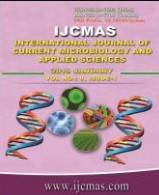


 National Academy of Agricultural Sciences (NAAS)
National Academy of Agricultural Sciences (NAAS)

|
PRINT ISSN : 2319-7692
Online ISSN : 2319-7706 Issues : 12 per year Publisher : Excellent Publishers Email : editorijcmas@gmail.com / submit@ijcmas.com Editor-in-chief: Dr.M.Prakash Index Copernicus ICV 2018: 95.39 NAAS RATING 2020: 5.38 |
Groundnut being one of the important oilseed crops rapidly deteriorates during storage due to accumulation of cytotoxic compounds leading to loss of viability and seedling vigor. Although seeds deteriorate naturally during storage, the time taken for complete deterioration process is longer. Globally, researchers employed accelerated ageing method efficiently to screen large number of genotypes to assess the genetic variability for cellular tolerance. In our study, accelerated ageing technique was standardized by exposing the seeds to different incubation time and found 45°C for 6 days maintaining 100% RH as challenging incubation period for groundnut. However, drastic reduction in seed germination was observed as the incubation period increases and the trend was similar for seed viability and seedling vigor index. Later, genetic variability for seed viability, vigor and accumulation of cytotoxic compounds was examined across groundnut genotypes upon ageing. Further, the correlation study suggest, inverse relationship between cytotoxic compounds and seed viability, germination and seedling vigor index. Accordingly, some of the genotypes namely, KCG6 and ICGV9114 were found to be susceptible to aging treatment, showing reduced seed viability, poor germination with higher accumulation of cytotoxic compounds compared to tolerant genotypes like SB3 and SB15 which showed longer seed viability that accumulated less cytotoxic compounds. Further, gene analysis of some of downstream target shows its relevance in enhancing seed viability.
 |
 |
 |
 |
 |